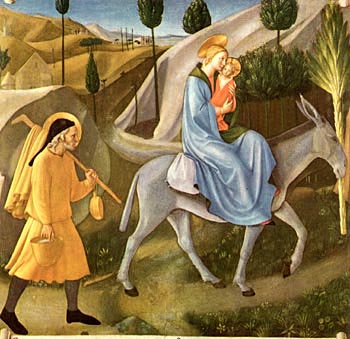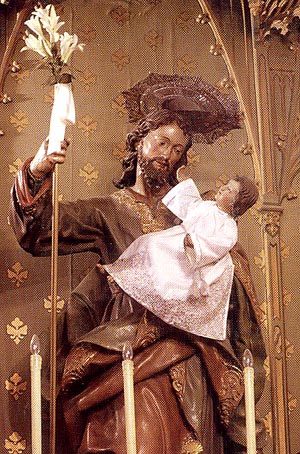 |
The Saint of the Day
St. Joseph, March 19
Prof. Plinio Corrêa de Oliveira
There is not very much biographical data about St. Joseph. We know that he was from the royal dynasty of David. He was a virgin, he was married to Our Lady, they remained virgins after marriage. He was present at the Manger at Christmas. He journeyed with the Divine Infant and Our Lady to Egypt and returned. After that, there is silence about him.

St. Joseph, Our Lady and the Christ Child on the flight to Egypt by Fra Angelico
|
What is the beauty of the silence of Holy Scriptures regarding St. Joseph? What facet of the spirit of the Church shines in this silence?
St. Joseph was the greatest saint, or one of the greatest saints of the Church, since some sustain that either St. John the Baptist or St. John the Evangelist would be the greatest saint. In any circumstance, there are very good reasons to suppose that he, St. Joseph, was the greatest saint. One would expect to find an abundance of edifying biographical material about so great a saint. But the opposite is true: both Scriptures and Tradition say very few things about him. How can this be explained?
First, we can observe that Scriptures only speak a few times about Our Lady, who is much more than St. Joseph. She is the masterpiece of creation, incomparable to all others. Again, why do Scriptures say just a few words about these two great figures?
The traditional reason given is that both were very humble and chose to be out of the limelight in order to let Our Lord shine and receive all the honor and glory. This is a very good reason, but there is something else.
It is something that reflects the spirit of the Catholic Church very much. Any magnificent actions in their lives were overshadowed by the fact that Our Lady was the mother of the Creator and St. Joseph was the foster father of Our Lord Jesus Christ and spouse of Our Lady. Anything else they did was effaced in light of this.
For example, consider these two extraordinary facts: the perplexity of St. Joseph in face of the pregnancy of Our Lady, and her action at the wedding of Canaan, where she requested and obtained a miracle from Our Lord. St. Joseph took a very noble position. Our Lady did something remarkable. But these facts dull in face of the grandeur they had as mother and father of God.

Any facts about St. Joseph dull in view of the grandeur of his title of foster father of Our Lord
|
You can also analyze the fact that St. Joseph was chosen to be the spouse of Our Lady. With regard to Our Lady, God was extremely careful. He respected and venerated her so much that during the Passion, when He permitted Our Lord to be morally insulted and physically chastised, He did not permit anyone to touch Our Lady, not even with the tip of a finger. Now, if God venerated Our Lady so greatly, He would have shown tremendous care in choosing a spouse for her. He chose a spouse proportional to her in order to constitute the perfect family.
But what does it mean be proportional to Our Lady? Only this title – spouse of Our Lady – is something far beyond and higher than anything St. Joseph did or could have done. Along this vein, another question arises: What can be more admirable than having been chosen to be the foster father of God? Nothing can be comparable to that.
There is something even more beautiful here. Divine Providence permitted the cult of St. Joseph, as well as of Our Lady to develop. These cults were not based on a plethora of information. Instead, they were based on the theological reasoning that St. Joseph and Our Lady were the father and mother of God. Therefore, they should be the greatest saints. With this, God left man to imagine the moral profiles of these two saints, based on the sources of Revelation.
Because Catholics do not practice free interpretation of the Scriptures, they follow the guidance of both the Magisterium of the Church and sound theologians. When God hid the detailed account of St. Joseph and Our Lady's lives, He encouraged and inspired the Church to contemplate their many facets and learn from the Hierarchy. That is to say, He wants the saints and the doctors to elaborate the doctrine from the abridged data He gave us. He wants man to distill from Scripture and Tradition the good doctrine He hid there, as the bee draws nectar from the flower. When someone sees a flower, he doesn’t imagine that something so sweet would be inside. The same is true regarding many truths of Revelation, especially with regard to St. Joseph and Our Lady.
So, from the silence of Scriptures regarding St. Joseph and Our Lady, you can deduce the approval of God for the hierarchical character of the Catholic Church.
It seems to me a remarkable way to better understand one beautiful facet of the Catholic spirit.


Related Topics of Interest
 The Saints Speak about Devotion to St. Joseph The Saints Speak about Devotion to St. Joseph
 With St. Joseph at Christmas: In a Sea of Peace With St. Joseph at Christmas: In a Sea of Peace
 Prayer to St. Joseph Prayer to St. Joseph
 The Great St. Joseph The Great St. Joseph

  | | Prof. Plinio Corrêa de Oliveira | |
The Saint of the Day features highlights from the lives of saints based on comments made by the late Prof. Plinio Corrêa de Oliveira. Following the example of St. John Bosco who used to make similar talks for the boys of his College, each evening it was Prof. Plinio’s custom to make a short commentary on the lives of the next day’s saint in a meeting for youth in order to encourage them in the practice of virtue and love for the Catholic Church. TIA thought that its readers could profit from these valuable commentaries.
The texts of both the biographical data and the comments come from personal notes taken by Atila S. Guimarães from 1964 to 1995. Given the fact that the source is a personal notebook, it is possible that at times the biographic notes transcribed here will not rigorously follow the original text read by Prof. Plinio. The commentaries have also been adapted and translated for TIA’s site.
|
Saint of the Day | Home | Books | CDs | Search | Contact Us | Donate

© 2002- Tradition in Action, Inc. All Rights Reserved
|
 |

|